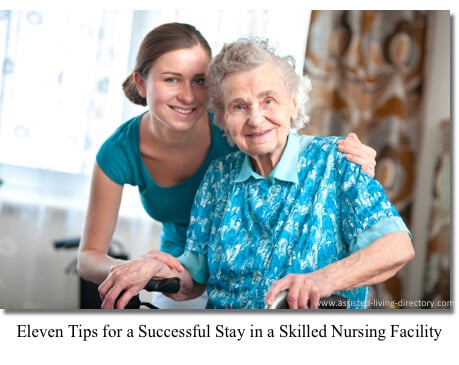Eleven Tips for a Successful Stay in a Skilled Nursing Facility
Eleven Tips for a Successful Stay in a Skilled Nursing Facility

Summary: From experience, Trish offers her 11 tips for someone living at home, or in an assisted living facility, on having a Successful Stay in a Skilled Nursing Facility. A SNF is often times needed as a transitional care environment (before returning home, or to assisted living) after the initial, acute issue has been resolved.
Author:Trish Hughes Kreis exclusively for Assisted Living Directory.
Whether caring for someone who is living at home or who resides in an assisted living facility, there is always the possibility of a hospital stay. Accidents happen, infections strike and declining health can compromise mobility or the immune system. An interim stay in a Skilled Nursing Facility (SNF) is often times needed once the initial acute issue has been resolved.
In order to make the stay in a SNF as successful as possible there are several aspects of care to keep in mind before leaving the hospital, while staying in the SNF and before, finally, returning home.
1. Choose the Best Fit. The hospital discharge planner can (and should) provide a list of facilities that have availability. Availability is not the only consideration, 11 tips for a successful stay in Skilled Nursinghowever. What does the patient need? Is the focus on physical therapy or long-term IV antibiotics? Find out if the facility has the needed therapists on staff and how often they are able to provide rehabilitation even ask if services are provided on the weekends. Other considerations should be the special needs of the patient. Do they have seizures or are they incontinent or have dementia? Find out if the facility is qualified and able to provide any special care that may be needed.
2. Timing is Everything. Anyone who has experienced a discharge from the hospital knows it can take a long time. If there is a choice given for discharge, try to be transferred to the SNF as early in the day as possible. There is a flurry of activity once transferred to the SNF so it is in the best interest of everyone involved if arrival can be scheduled before a shift change and certainly before a weekend.
3. Check the Discharge Orders. The SNF can only do what the hospital discharge physician has ordered on the discharge paperwork. If two hours per day of physical therapy is needed, make sure specific orders are written for that. It will save a lot of phone calls and heartache to check all orders for special dietary restrictions, medications, necessary therapies and even an estimated length of stay.
4. Check the Orders Again upon Arrival. It can be chaotic upon arrival to the SNF. However, it is necessary to meet with the intake nurse to review all medications, dietary restrictions and plans for care. Be sure there is a contact number in the chart in case any questions or emergencies arise. It is helpful to be very specific about the personal item inventory as well as any skin conditions. Finally, ask about other orders the SNF may have (for instance, use of bedrails or personal alarms for patients designated as a fall risk).
5. Get to Know the Staff. There will be several people taking care of your loved one and, yes, they are doing so because it is their job but the majority of them are also there because they love helping people. Get to know the nursing staff, CNAs, therapists, administrators and janitorial staff. Everyone appreciates being recognized and a “thank you” even an occasional box of donuts! If someone goes above and beyond, please make sure the administrators know about it.
6. Get to Know the Roommate. Most patients have to share a room and, letface it, most of us havent had to share a room with a stranger since college. It can be challenging to adapt to someone elsesleep patterns or television viewing habits. A rehabilitative stay in a SNF is temporary so minor annoyances can probably be overlooked. However, if there is a real problem with schedules or noise levels or personalities, dont wait to request a room change.
7. Follow-up on Progress. Communication is essential. Check in with the physical therapist and the nurse as well as your loved one. Is everything going as planned? Is your loved one being cooperative? Are there adjustments that need to be made? Sometimes, something as simple as changing the time of day for physical therapy can make a huge difference. Italso important to notice and report any new problems so they can be addressed immediately.
8. Visiting Hours. To get the most comprehensive view of how the patient is doing, visit at different times of the day.
9. Take Advantage. For caregivers, this will sound like a foreign concept but it is critical to take care of YOU. While your loved one is in the SNF and cared for by others, take advantage of the time to regroup, refresh and participate in self-care. Take advantage of this time to organize medical records and logs that have piled up or, if necessary, get the patienthouse ready for their return.
10. Partner with Your Caree. As a caregiver, it is easy to slip into an “I know best” attitude. We very well might know best but it is essential to work with the patient to figure out what they need and want. Sometimes it is different than what is “best.” A compromise might be reached as long as safety is not at risk. Carees lose the ability to make so many of their decisions as their health declines so it is important and empowering to give them choices whenever possible.
11. Discharge Planning. Discharge should not come as a surprise. With constant communication with the staff, the discharge date should be a mutually agreed upon time and the goals for the patient should have been met. Take advantage of any services the discharge planner recommends such as home physical therapy or nursing care. However, it is okay to decline services if itthought they will not be of use. Of course, be clear upon discharge what medication has already been given for the day and what medication is being sent home.
Hopefully, with these tips, your experience with a Skilled Nursing Facility will be a positive one and one that greatly benefits your loved one.
– Article by Trish Hughes Kreis exclusively for Assisted Living Directory
Kenneth Wrote:
I have volunteered at some nursing homes in the past and there is quite a difference in a quality facility. I like that you mentioned visiting at different times of the day to get a feel of the care. I think if you research and tour the facility you will be able to find a great place for your loved one. Kenneth
27 January 2017 at 10:51 am
Sarah Wrote:
My grandma is getting old and needs help. Thanks for the advice about making sure to get a nursing home that is the best fit for your family. It would also be smart to make sure that your grandma likes the staff. Sarah
12 October 2016 at 11:52 am
Annie Wrote:
I wasn’t aware that most patients in a care home have to share the room with another person. That would be a good thing to know before my grandma goes to one. Even if she has to have a roommate, she should still have the personal care she deserves. Thanks for the info.
9 June 2016 at 1:52 pm
No Obligation
Assisted Living with Eleven Tips for a Successful Stay in a Skilled Nursing Facility




